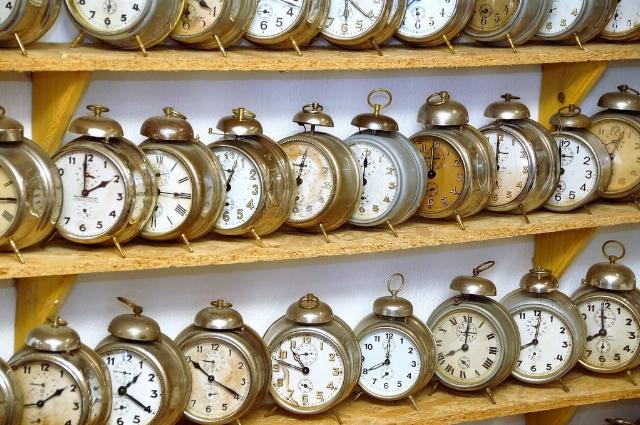Enough ‘spring forward/fall back’
Hey, guess what -- World War I is over! Get used to it! We no longer need to conserve that new-fangled stuff called electricity so we can defeat the Kaiser.
It just so happens that the semi-annual time-shift currently imposed on all but two of the United States is much more disruptive than the effects of jetlag. When traveling into another time zone, the sun still rises and sets at the same local time as before. When the clocks are changed, however, the visual cues that affect one’s circadian rhythms are not changed. So why do we keep doing this?
There is overwhelming political support for abolishing the time shift. Most folks favor staying in daylight savings throughout the year. While staying in standard time is a close runner-up. Bottom line: making us change our clocks twice a year is totally unpopular. And yet our political professionals seem to have punted on the issue… ostensibly because they couldn’t achieve a consensus as to whether to make daylight savings or standard time the one to be permanent. A simple coin toss could have solved this problem.
Why bring this up now? It just so happens that we must lurch back into standard time just two days before the official date of this year’s election. It may seem that springing forward could be more disruptive than falling back, but there’s still a serious impact from the one hour back-shift. Early voting may take away some of the impact…but most of the tabulating of the election’s results and all of the “news” reporting on it will definitely occur after the befuddling time shift happens.
Although, at least to me, it seems that setting the clocks ahead has more negative impact than setting them back. But compiled statistics show that both changes accompany similar increases in heart attacks. Shift workers in particular are already seriously stressed over their daily sleep-work schedules. It would only make sense for them to be especially impacted by this nonsensical tinkering.
That we are still compelled to go through with such a major inconvenience is nothing more than a throbbing example of negligent tyranny -- government needlessly harming its citizens due to its lack of serious concern. This is especially obnoxious since no compelling reason for doing this damage still exists. It is, of course, true that the days naturally keep getting shorter anyhow. That will always continue until just before Christmas -- which has been happening since long before the beginning of time. Screwing with clock settings doesn’t change that -- it just puts a lot more groggy drivers on the roads during the morning commute.
I suspect that the pullers of the levers of power are disregarding this glaring example of the government not going out of its way to avoid harming its citizens. Why? As usual, they think that they can get away with it. After all, we’ll get a whole weekend to adjust. Whoopie!
Until about the mid-1800s, timekeeping was mostly done at a local level -- hence the continuing use back then of sun dials even though reliable mechanical clocks were becoming fairly common. Governments started getting seriously involved in standardizing time once railroads became a common conveyance that allowed people to quickly move across meridians of longitude. For railroads to operate on a specific schedule, time had to be standardized across a defined swath, east to west. We now call these Time Zones.
In his book Sapiens, Israeli neo-Marxist Yuval Noah Hariri has a particularly interesting segment on the formalization of time. It was yet another way the world was changed… largely due to technology. Bottom line: “Official” time is a fairly new concept. Daylight savings is a little over a hundred years old.
As usual, I’m planning on changing my clocks a few days early… so I can have more than just a weekend to adapt. However, my internal clock has me falling asleep and getting up earlier rather than later… perhaps because it’s getting dark earlier and earlier. Also, I’m kind of, sort of looking forward to not bumbling around in the dark when I get up -- but it’s still going to keep getting dark earlier. At least this happens gradually rather than suddenly.

Image: Pixabay
Ad Free / Commenting Login
FOLLOW US ON
Recent Articles
- Trump-O-Phobia Drives Some Americans to Questionable Greener Pastures Overseas
- A Businessman and a Brilliant Strategist
- A Remarkable Headline for a Fascinating Story
- Democrats Unmask Themselves
- How Mexico Became China’s Trojan Horse in U.S. Trade
- Covid Redux: The Bird Flu Scare
- A Taste of the Swamp
- Do We Have 677 Unelected Presidents?
- Global Relations beyond the Prime Directive
- The Democrat Party: The Enemy Within?
Blog Posts
- Hills to Die On: Democrats know how to pick 'em
- Near-death experiences, reliance on oil, and more cataclysmic failures—it’s all just part and parcel of ‘green’ energy
- So where'd America's obesity epidemic come from? Chef Andrew Gruel has a theory ...
- Trump just fired a huge warning shot over Iran’s bow
- Markets respond: Trumpian peace in Russo-Ukrainian war is in the bag
- The time of the hoax
- New York Times goes bipolar on Trump’s border control success
- Mark Kelly decides to offload his Tesla to protest Elon Musk
- The half-million dollar American
- Three things for the U.S. to understand about the Middle East
- Speaker Mike Johnson reveals why the Autopen scandal is a big deal
- The CDC website really needs to update its COVID protocols
- Hands in your back pocket
- Birthright citizenship: The facts
- ‘She’s my little Musk coupe’






